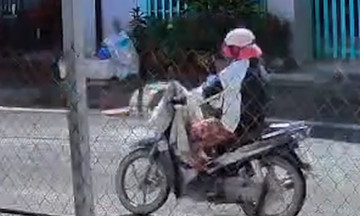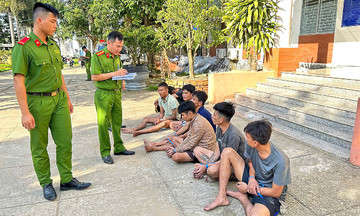In movies, TV shows, and even memes, a familiar image has become a classic depiction of police officers in some countries, especially the UK, Canada, and the US: a donut always in hand.
This humorous, sometimes exaggerated, image has become one of the most recognized cultural symbols in the world. The New York Times even stated, "No profession is as closely associated with food as police are with donuts," so much so that the history of this "sweet love affair" has been a subject of fascination for years.
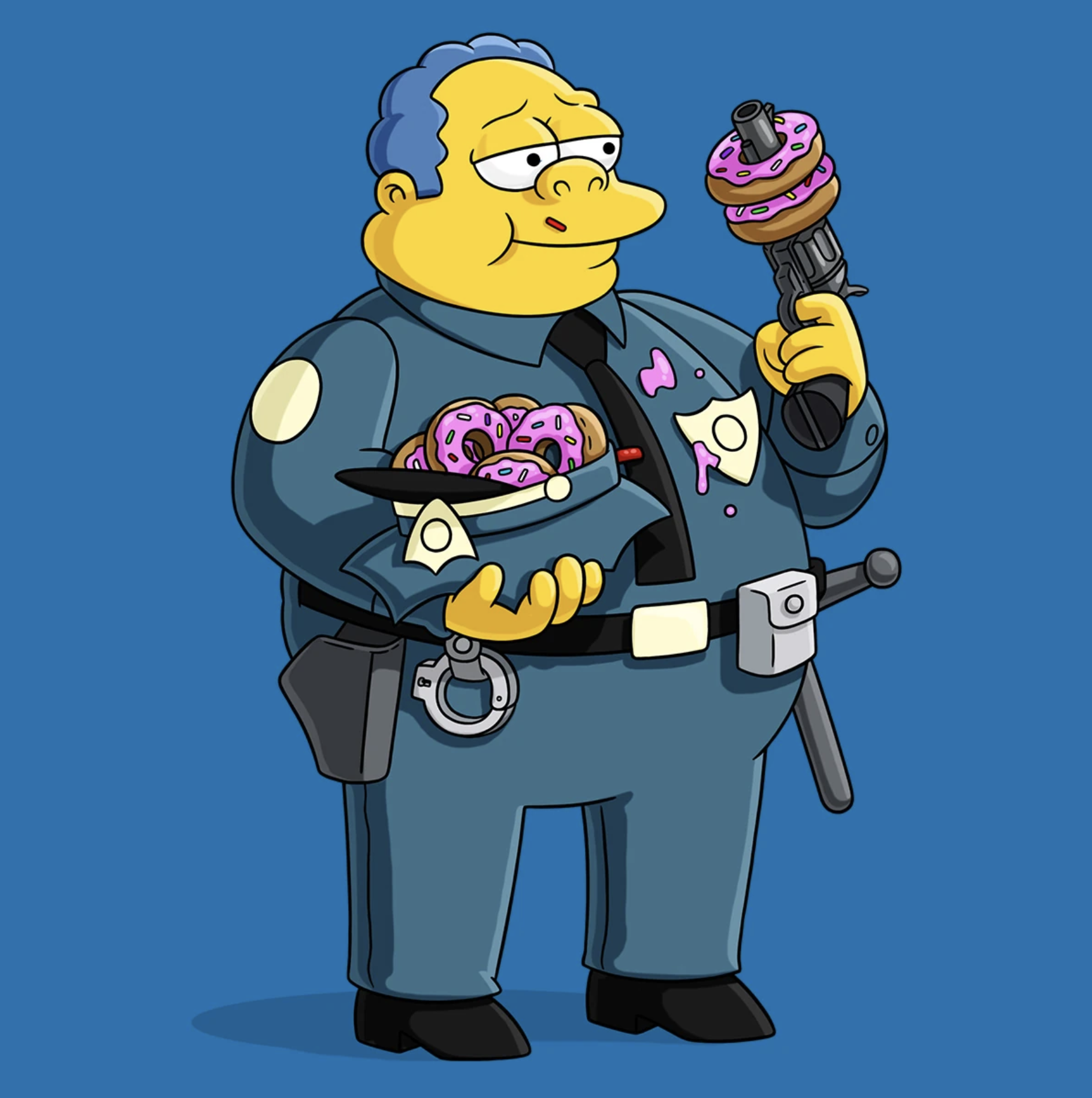 |
Chief Wiggum in The Simpsons is associated with a love for donuts. Photo: Simpsons Wiki |
Chief Wiggum in The Simpsons is associated with a love for donuts. Photo: Simpsons Wiki
The story begins in the mid-20th century when US police departments started transitioning from foot patrols to patrol cars. Night-shift officers needed a place to park, use the restroom, quickly refuel with caffeine and sugar, and perhaps fill out some paperwork or make urgent calls.
At that time, 24/7 convenience stores, gas stations, and diners didn't exist. Only 10% of stores were open all night, mainly casinos. Female officers even had to enter casinos or buy a cup of coffee just to have an excuse to use the restroom.
Around this time, two new donut chains opened and began spreading across the US. Because these shops operated from early morning to late evening, they were ideal stops for patrol cars.
Economical, convenient, and efficient
For many, donut shops were more suitable and economical than restaurants when you just wanted a quick snack with coffee, not a full meal.
More importantly, donuts were served almost instantly, unlike having to wait for a meal. This suited the nature of police work, where officers could be dispatched unexpectedly. "They're cheap enough to throw away without feeling guilty if an emergency call comes in mid-snack," one officer said.
The shops also had air conditioning and comfortable tables and chairs to work at night, making them especially suitable for patrol officers to do paperwork and reports.
Besides the convenient facilities, the appeal also lay in the food itself: donuts are rich in sugar, carbohydrates, and fat, providing a triple dose of energy, much appreciated during long night patrols.
A former Philadelphia police chief shared that when you spend all day outside apprehending criminals and burning calories, donuts are a readily available energy source, unlike food in 24-hour restaurants, and they come in many varieties.
Meanwhile, having police around made donut shop employees feel safe. Donut shops were often open all night or were among the first to open at dawn.
A baker might work all night to prepare a fresh batch of pastries, making them a prime target for robberies. However, if police cars were constantly coming and going from donut shops, no robber would target them.
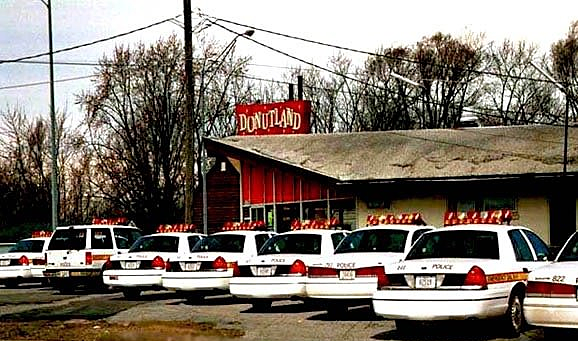 |
Police cars parked around a donut shop. Photo: Old Police Stories |
Police cars parked around a donut shop. Photo: Old Police Stories
Often, donut shops would offer free donuts and coffee. Some even reserved specific spots for police gatherings. After all, it was still cheaper than hiring security.
According to the New York Times, donut shops have the lowest robbery rates among other retail businesses.
In his autobiography, William Rosenberg, the founder of one of the world's largest donut chains, Dunkin' Donuts, said that their police-friendly policy fueled the company's success. This symbiotic relationship gave rise to the popular notion that police officers are addicted to donuts.
This 'love affair' has a deeper history
Since World War I, American female volunteers went to France to bake donuts and bring them to the front lines for soldiers. There, a young second lieutenant knelt before a stove to make the first batch of donuts.
They hoped that the taste of home would do more than just satisfy physical hunger. For a time, American soldiers were actually called "doughboys".
After the war ended, the soldiers returned with their taste for donuts and the tradition of "donuts as a thank you". Relief organizations also continued to include donuts in disaster relief packages. But this soft, sweet treat filled the stomachs of millions of victims and rescue workers, including police officers.
New York City Police Detective Tom F. Weiner Jr. also shared with the Times that when he had to collaborate with other units, he and his colleagues often brought a box of donuts "just to break the silence, like businessmen inviting each other to lunch." And the work went as smoothly as friends at a bar.
Soft, sweet, and colorful, donuts are also a way for police to indirectly create a friendly and approachable image with the public.
Historian Jim Paradis analyzes that people always think of policing as a disciplined, patriarchal, strict, and potentially violent profession, while donuts are soft and sweet. Police enjoying donuts, according to the Wilmington, Pennsylvania Police Department, is a creative way to strengthen the department's relationship with the community.
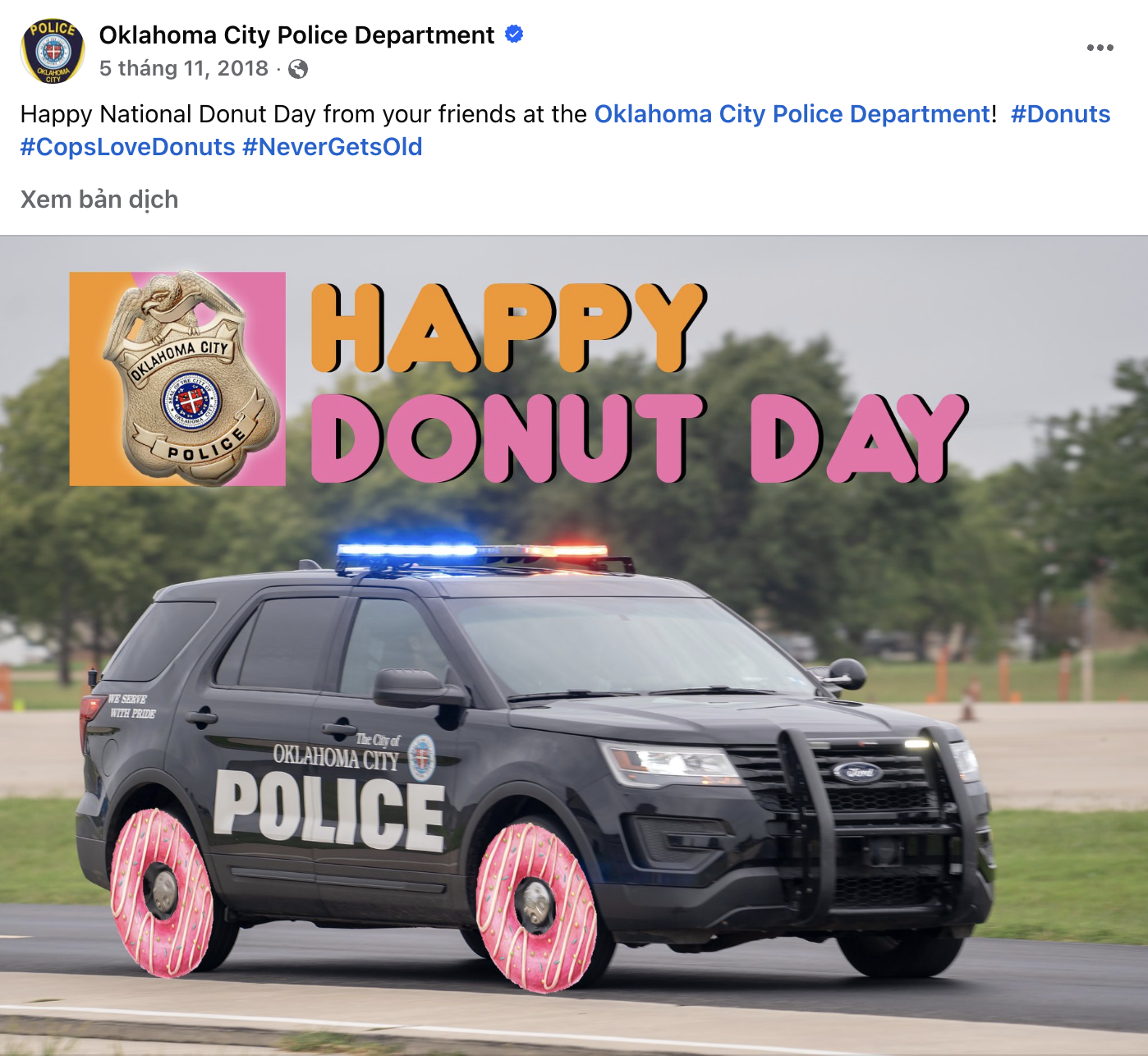 |
Oklahoma City Police Department celebrates National Donut Day, 5/11, with a humorous photo of a patrol car with two donuts as wheels. Photo: Oklahoma City Police Department |
Oklahoma City Police Department celebrates National Donut Day, 5/11, with a humorous photo of a patrol car with two donuts as wheels. Photo: Oklahoma City Police Department
"Police officers are just regular citizens out there doing a difficult job and need the help of other citizens. That's the message we want to convey, and it's a way to soften these tense relationships," they said.
Donuts became such an iconic food for the profession that when a long-standing donut shop in Clare, Michigan announced its closure in 2009, the entire police force pooled their money to buy it and keep it running.
They renamed it Cops & Doughnuts and turned it into a 24/7 attraction for both diners and tourists. The donuts there have interesting names related to the profession: "Night Shift" donuts, "Taser" donuts, "Snitch" bread, "Criminal" donuts, and so on.
This Michigan bakery is so famous that they opened a gift shop next door, where people line up at the counter to take pictures of their coffee "mugs".
Hai Thu (According to NYT, Slate, DonutInfo, The Fact Site)






